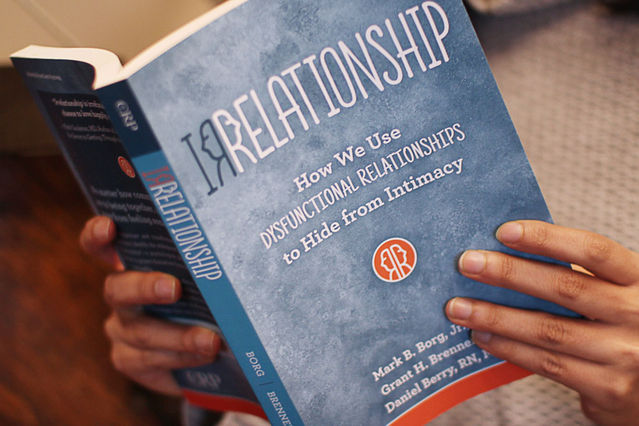Relationships
Healthy Dependency
Dependency can be one of the most genuine parts of a relationship.
Posted October 31, 2016
Dependency is often seen as a negative quality in a relationship. The authors, however, are not so quick to see it that way.
For many of us, the approach of the Winter holidays brings our isolation or fear of being alone into the forefront of our consciousness. We may turn to relationships laden with irrelationship-based defense routines that relieve the immediate fear of being alone while paradoxically adding to the pervasive isolation characterizing our lives. This is usually seen in replays of past relationships that left us feeling unsatisfied and un-cared-for.
But what are we referring to when we speak of healthy reliance on others? If the question bothers us, it may point to ambivalence about closeness to others that connotes shared empathy and intimacy and investment in others that brings a sense of vulnerability with it. Does such ambivalence indicate we’ve bought into widespread ideas about dependency that see it as illness?
The authors propose an alternative strategy of “depathologizing” dependency (Bornstein, 1998) thus allowing ourselves the quintessentially human need and desire to share our burdens with another, not just as a means of relieving stress, but at least as importantly, as a means of building intimacy. In that instance, dependency becomes a “prosocial” behavior.
Let’s face it: whether or not we like to phrase it this way to ourselves, we depend on one another: we form groups, become part of teams and even create our own families, biologically or otherwise. We do things with others in hopes of creating positive regard, harmonious and useful working relationships, as an expression of kindness or, perhaps, love; and even to have a positive impact on the world beyond our own lives. When functioning this way with focus on agreed-upon tasks, we become interdependent while, at the same time, able to achieve more than we could by ourselves. Even capitalistic economic systems require cooperation at least as much as they require competition.
This isn’t to negate the reality clinicians observe in relationships affected by irrelationship: relationships with deliberately built-in, stultifying techniques for maintaining distance between partners deliberately disallow openness to the unexpected and uncontrollable life-experiences—experiences that can build enriching connections between partners and others. More generally, closing out of spontaneity hampers development of life-skills that leave us unprepared to develop healthy, mutually dependent connections that provide support and feelings of safety when we encounter stressors that are part of everyone’s lives. The process of creating such mutually supportive and nurturing relationships is what the authors refer to as building relationship sanity.
The dependency developed in irrelationship is based on partners’ reliance on each other to avoid exposing them to situations that make them uneasy. For example, if I use recurring “illness” to avoid uncomfortable social or work situation, my partner will enable my avoidance by not questioning my complaints of illness and “calling in sick” for me, or by making excuses for me when I want to avoid an uncomfortable social gathering. As long as both partners stick to their silently agreed upon contrived roles, their interdependent “relationship” will remain stable.
By contrast, interdependency in healthy connections creates safe living space for us to work out jointly the bumps as well as the crises of everyday life. Additionally, research indicates that relationships that are resilient and open to spontaneity are associated with reliable, supportive social networks (Iacoviello and Charney, 2014).
Renowned relationship expert, Dr. Sue Johnson (2103) has written:
Emotional dependency is not immature or pathological; it is our greatest strength...Far from being a sign of frailty, strong emotional connection is a sign of mental health. It is emotional isolation that is the killer. The surest way to destroy people is to deny them loving human contact (pp. 21-22).
The following is a written response the authors received from a client:
I still can't wrap my head around the concept of dependency/trust. Both words are packed with layers of meaning, literal and implied. I think at times, for me, the line is blurred between what is healthy reliance on an outside force or person and what results in a diminishing of a person's active ability to care for self. I'm rolling all this around in my head because, once again, I'm questioning what is a productive dependence in relationship and what can develop into an inability to function on one's own.
I ask myself, what is dependency? Where does it start?
As far as I can see, dependency starts at birth. I know this experientially, as a parent. My infants were totally dependent on me physically and emotionally. And without my sincere and constant attention to those needs, I feel my babies would not have survived. I felt it in my own body as a mother, and in my heart. There was this pull and desire to mother, to protect. If I were away too long from my infant, my breasts would ache with the heaviness of my milk supply reminding me my little one was hungry. Then as time went on my role became that of a guide to introduce my children to others who were trustworthy and so it went (simply put)...we allow our children to trust the world.
What happens when that message is never imprinted on an infant? What happens when your mother has no such pull to want to protect. Of course, I'm talking about myself. I didn't have a mother who picked me up when I cried so eventually I stopped crying. There's only so much self-soothing an infant can do. I just went without for the most part. I was not cared for or supervised beyond being punished if something went wrong. I don't pity myself, I'm just reminding myself why I'm almost totally unable to generate any trust in relationships, even seemingly healthy ones. If I do experience trust, I can't seem to maintain the feeling. My early lessons are deeply imbedded in my brain. I'm having a hard time letting go of them. All I can feel is the knowledge that my own parents had no interest in me, the aloneness of crying myself to sleep.
The bottom line is, I can understand things intellectually of course. But emotionally, the slightest perceived dissonance and I feel I'm getting set up. You may ask "For what?" And unfortunately I can't give a reasonable answer. I don't seem to be able to trust people. I've shown so much of my internal mental gymnastics in this process (group work) that I feel vulnerable to some unidentified danger. Believe me, I know it's not coming from you (facilitator) this I know.
I developed these beliefs about dependency because I grew up in a world that was dependable: I could count on it, my parents especially, to be unable to care for me, and sometimes, to hurt me. I can see what I'm going to need to do, alone or with others...that is to deconstruct this mental system I've inadvertently created. I think it's considered "integration" but I see it as a knocking down of the walls isolating me from people with whom I've been ostensibly close... a demolition job. (But gently.) As the memories come back, my system will no longer serve its purpose and I'll be faced with adjusting to a new internal order. I just have this absurd but pervasive feeling of being injured if I allow myself to show any weakness or need.
For years, this person's irrelationship routine allowed her to distance herself from buried feelings of vulnerability and need. Finally, when the stress driving the isolation and loneliness of her routine broke through, she became willing to take on the work of building relationship sanity into her everyday life.
References
Bornstein, Robert (1998). Depathologizing Dependency. The Journal of Nervous and Mental Disease. Volume 186(2), February 1998, pp 67-73.
Iacoviello, B.M., Charney, D.S. (2014). Psychosocial facets of resilience: implications for preventing posttrauma psychopathology, treating trauma survivors, and enhancing community resilience. Eur J Psychotraumatol. Oct 1;5.
Johnson, S. (2013). Love sense: The revolutionary new science of romantic relationships. New York: Little, Brown and Company.
To order our book, click here. Or for a free e-book sample, here.
Join our mailing list: http://tinyurl.com/IrrelationshipSignUp.
Visit our website: http://www.irrelationship.com
Follow us on twitter: @irrelation
Like us on Facebook: www.fb.com/theirrelationshipgroup
Read our Psychology Today blog: http://www.psychologytoday.com/blog/irrelationship
Add us to your RSS feed: http://www.psychologytoday.com/blog/irrelationship/feed

*The Irrelationship Blog Post ("Our Blog Post") is not intended to be a substitute for professional advice. We will not be liable for any loss or damage caused by your reliance on information obtained through Our Blog Post. Please seek the advice of professionals, as appropriate, regarding the evaluation of any specific information, opinion, advice or other content. We are not responsible and will not be held liable for third party comments on Our Blog Post. Any user comment on Our Blog Post that in our sole discretion restricts or inhibits any other user from using or enjoying Our Blog Post is prohibited and may be reported to Sussex Publisher/Psychology Today.




